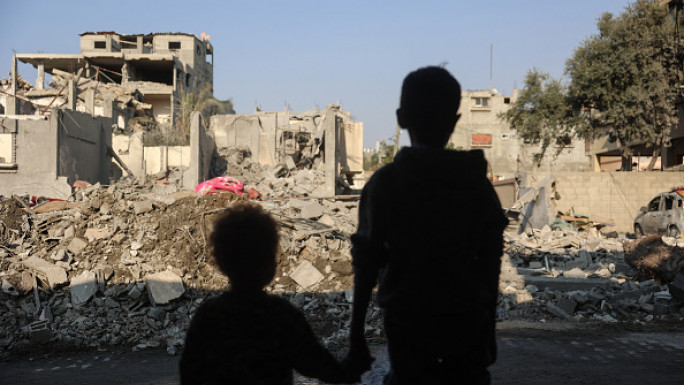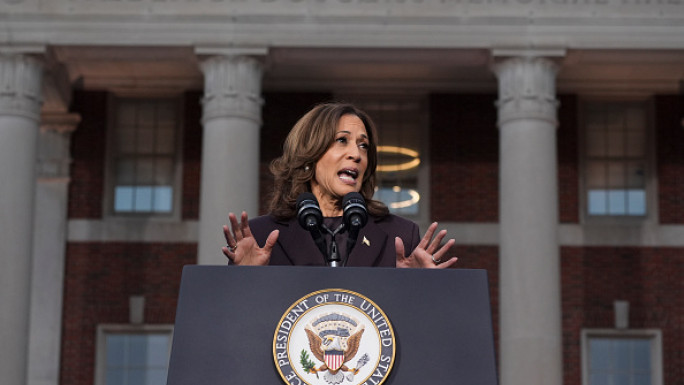
Why we should support Britain's new counter-extremism chief
Why we should support Britain's new counter-extremism chief
Comment: Criticism of Sara Khan's appointment as head of the Commission for Countering Extremism is misguided, and distracting from the task at hand, writes David Powell.
6 min read
The Muslim Council of Britain says Khan doesn't represent the Muslim community [CC/Mramoeba]
Sara Khan certainly has her work cut out.
The newly appointed head of the UK's Commission for Countering Extremism - set up to advise the British government on ways to stop people falling prey to extremist radicalisation of all types - is well used to taking on tough jobs. But the outcry that has followed her appointment threatens to make that job even harder.
A decade ago, Sara Khan set up Inspire, an organisation encouraging British Muslim women to fight for their legal rights and campaigning against forced marriage. When the Islamic State group declared its "caliphate" in 2014, she turned to fighting the extremist recruitment of youngsters in the UK, especially girls.
Inspire's "Making a Stand" campaign encouraged women across Britain to fight back against recruiters for IS, al-Qaeda and their ilk, identifying them as a particular threat to young Muslim women, whom they seek to lure into a life of servitude and sexual slavery.
When three young girls from London went to join the Islamic State group in Syria in 2015, Khan wrote an open letter for teachers in the capital to read to their young students. In it she implored them not to fall for the "poisonous ideology" that has now drawn an estimated 800 British youngsters into the arm of IS in Syria.
Inspire's "Making a Stand" campaign encouraged women across Britain to fight back against recruiters for IS, al-Qaeda and their ilk, identifying them as a particular threat to young Muslim women, whom they seek to lure into a life of servitude and sexual slavery.
When three young girls from London went to join the Islamic State group in Syria in 2015, Khan wrote an open letter for teachers in the capital to read to their young students. In it she implored them not to fall for the "poisonous ideology" that has now drawn an estimated 800 British youngsters into the arm of IS in Syria.
Inspire now offers teachers across Britain guidance on safeguarding pupils from being drawn into extremism, whether from Islamist groups or the far right. And she and her organisation give talks regularly in schools about extremism, shared values and women's rights.
What better person then to run the UK new anti-extremism body?
Its aim after all is to advise government on ways to stop people falling into the trap of radicalisation and ensure that pluralistic values win out against ideologies promoting hatred and misogyny.
But Khan's appointment has prompted a remarkable protest. And not just from the organisations who claim a monopoly on representing Muslim interests in Britain, but from left-wing Labour MPs and feminists too.
 |
Her work shows that when extremism enters the bloodstream of a society it divides communities |  |
But Khan's appointment has prompted a remarkable protest. And not just from the organisations who claim a monopoly on representing Muslim interests in Britain, but from left-wing Labour MPs and feminists too.
A group called Muslim Engagement and Development (MEND), which campaigns against Islamophobia in Britain, accuses Khan of not having the respect of the Muslim community or practical experience. It posts a petition on its website for people to send to their MP to call for Khan's appointment to be reversed.
The Muslim Council of Britain (MCB), an umbrella organisation of mosques and Islamic organisations, which aims to "shape the debate and provide the Muslim viewpoint", also attacks Khan for not being part of the Muslim community. They seek to marginalise and disparage a dissenting voice like Khan's by claiming she is unrepresentative.
Yet, her record in helping women, teachers and parents, fearful their children will be the next to be spirited away to the jihad abroad, shows there is no such blanket opposition to her work among British Muslims.
Read more: Spare us the World Hijab Day tokenism, and listen to us instead
The Muslim Council of Britain (MCB), an umbrella organisation of mosques and Islamic organisations, which aims to "shape the debate and provide the Muslim viewpoint", also attacks Khan for not being part of the Muslim community. They seek to marginalise and disparage a dissenting voice like Khan's by claiming she is unrepresentative.
Yet, her record in helping women, teachers and parents, fearful their children will be the next to be spirited away to the jihad abroad, shows there is no such blanket opposition to her work among British Muslims.
Read more: Spare us the World Hijab Day tokenism, and listen to us instead
These two groups also claim there is no "agreed definition of 'extremism' and 'radicalisation'". And this, at a time when so many British youngsters have been misled into traveling to Syria to join the most vicious terrorist group in modern times, shows they are in denial about the extent of the problem.
These groups have no difficultly, however, in identifying the far-right brand of extremism when it manifests itself in violence against British Muslims, such as in the attack outside a North London mosque last summer. Groups such as this argue that the government's anti-extremism agenda is nothing but a mask for deliberate targeting of Muslims generally, a form of Islamophobia.
They dismiss the UK's Prevent programme - which encourages teachers to spot the early signs of extremist radicalisation in their pupils before they drift into violence - as a sinister plot aimed only at Muslims.
These groups have no difficultly, however, in identifying the far-right brand of extremism when it manifests itself in violence against British Muslims, such as in the attack outside a North London mosque last summer. Groups such as this argue that the government's anti-extremism agenda is nothing but a mask for deliberate targeting of Muslims generally, a form of Islamophobia.
They dismiss the UK's Prevent programme - which encourages teachers to spot the early signs of extremist radicalisation in their pupils before they drift into violence - as a sinister plot aimed only at Muslims.
And it is over Prevent and the notion of fighting back against Islamist extremism in society that left wing groups have made common cause with those organisations that demonise the Prevent programme and anyone who fails to join their campaign to have it scrapped.
They echo the accusations that Khan enjoys no support among Muslims. Labour MP and Shadow Home Secretary Diane Abbott criticises Khan for "her support for the government's Prevent strategy", claiming her appointment will "not build confidence across our communities."
Others suggest she will be oblivious to other forms of extremism and focus unfairly on Muslims, that in doing so she is a government stooge, a "mouthpiece for the Home Office" in the words of Sayeeda Warsi, herself a former chairwoman of the Conservative Party and member of the House of Lords.
 |
Anyone who draws attention to extremism risks being seen as a government stooge or labelled Islamophobic, something that has happened to Khan |  |
Others suggest she will be oblivious to other forms of extremism and focus unfairly on Muslims, that in doing so she is a government stooge, a "mouthpiece for the Home Office" in the words of Sayeeda Warsi, herself a former chairwoman of the Conservative Party and member of the House of Lords.
In fact, Khan spends her time building confidence of Muslim women across the country to challenge the extremists as well as the Islamophobes in society. In doing so, she is not uncritical of the record of the Prevent programme, which targets political and racial extremism of all kinds, not only the Islamist variety.
She promises to begin her tenure running the Commission for Countering Extremism by looking at the scale of the problem and seeing what strategies work and which don't.
She promises to begin her tenure running the Commission for Countering Extremism by looking at the scale of the problem and seeing what strategies work and which don't.
The common factor between opposition to Sara Khan from the Muslim umbrella organisations and the political left in Britain is that they pretend that it is not extremism, radicalisation and terrorism that threatens civil liberties and divides society, but rather the government's response to it.
Anyone who draws attention to extremism therefore risks being seen as a government stooge or labelled Islamophobic, something that has happened to Khan herself.
 |
It is depressing to see political and ideological turf wars in Britain detracting from her support |  |
"I was speaking at a conference the other day, talking about the challenge of coming up against Muslim preachers in communities who are saying that the role of women was in the home - spouting this extreme, misogynistic stuff," she recently told The Guardian. "A white, middle-class feminist stood up and called me an Islamophobe. And this was for daring to condemn Muslim extremist preachers who don't give a shit about women's rights. Where's the feminist sisterhood there? It's gone down the pan."
Khan's rare insight is to show how extremism poses a particular threat to the rights and life opportunities of Muslim women. And she highlights the parallel between the grooming methods used by online paedophiles and terrorist recruiters.
Khan's rare insight is to show how extremism poses a particular threat to the rights and life opportunities of Muslim women. And she highlights the parallel between the grooming methods used by online paedophiles and terrorist recruiters.
Her work shows that when extremism enters the bloodstream of a society it divides communities, undermines women's rights and those of minorities and reinforces bigotry of all kinds as well as promoting terrorism.
With such a dire threat to society, it is depressing to see political and ideological turf wars in Britain detracting from support for someone who has shown the courage to speak up for the rights of women and minorities, the prime victims of extremism and hate that threaten us all.
David Powell worked for 20 years as journalist in pan-Arab television news, including BBC Arabic and MBC. He is now an analyst of Middle East affairs specialising in media and Islamist movements.
Want a different point of view? Read Malia Bouattia's article: Token brown faces are not what Muslim women want
Opinions expressed in this article remain those of the author and do not necessarily represent those of The New Arab, its editorial board or staff.


![President Pezeshkian has denounced Israel's attacks on Lebanon [Getty]](/sites/default/files/styles/image_684x385/public/2173482924.jpeg?h=a5f2f23a&itok=q3evVtko)



 Follow the Middle East's top stories in English at The New Arab on Google News
Follow the Middle East's top stories in English at The New Arab on Google News


